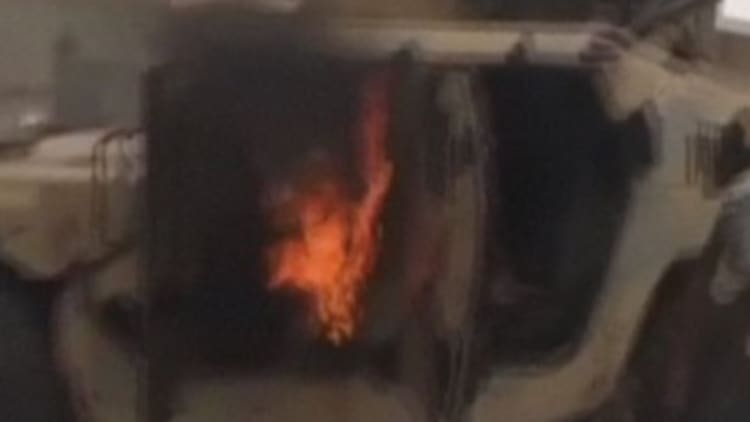
Iraq has been absent from the global agenda for years – but now the very existence of the state is being called into question.
A shadowy group known as the Islamic State in Iraq and Sham (ISIS) has managed to seize control of key cities including Mosul, the country's second-largest, Ramadi, Falluja and Tikrit.
Possibly most worryingly of all, the Iraqi government can't even decide if this is a "state of emergency" or not. The country's ambassador to France has called for international air support or drones to halt the advance of the militants.
As is the case so often in this region, the truth is hidden among layers of conflicting accounts from different sides. Here is a quick look at the latest developments.
Who is Isis and what have they done?
Isis, who split from Al-Qaeda earlier this year, have been steadily making inroads in the west of the country for months, taking control of Falluja -- famously the site of one of the bloodiest clashes of the most recent Iraq war -- late last year. Now, they seem to be pushing into the north, and grabbing some of its wealth - some reports say they have robbed Mosul's central bank.
Focus shifts to the north
Most of Northern Iraq, where much of the country's industry (and oil) is located, functions as an autonomous region, known as Iraqi Kurdistan or Kurdistan Region.
There are concerns in this region that declaring a "state of emergency" may be a way of establishing dictatorship over the whole of Iraq by Prime Minister Nouri al-Maliki, according to a source close to the government there. There are allegations from some of those fleeing Mosul that the Iraqi army did little to defend the city.
On Thursday, Kurdish military units known as peshmerga said they had taken "full control" of Kirkuk, in the Kurdistan Region.
"Many residents in Sunni-dominated Mosul were hostile towards Iraq's Shia-dominated army because they were harshly treated. The decision by army units to flee en masse may indicate they felt that Mosul, where they were considered occupiers, was not a city worth dying for," according to Hayder Al-Khoei, associate fellow, Middle East and North Africa, at Chatham House.
Prime minister under pressure
The Prime Minister described the seizure of Mosul as a "conspiracy" in a televised address on Wednesday night. The leader, from the Shia sect of Islam, led a clampdown on Sunni leadership last year, which is partly why the western part of Iraq became so vulnerable.
"Maliki is now paying the price for his often-combative approach to regional and international relations. At this juncture his inability or unwillingness to develop personal relationships is proving a weakness," according to Wolfango Piccoli, managing director at Teneo Intelligence.
Refugees on the move
The fighting has added to the mass displacement of populations in the region. Iraq has already had to cope with close to 200,000 refugees from neighboring civil war-torn Syria, according to the United Nations (UN) (to put this in context, the population of Iraq itself is around 32 million people). Now, its non-captured cities and towns face a further influx.
"Thousands continue to flee," said Gemma Woods, a protection officer for UNHCR, the UN refugee agency. "I saw and spoke with many in similar straits. They fled with the clothes on their backs, a bit of cash in their pockets, and nothing else."
Global implications
Beyond the suffering of a population who have already endured decades of conflict, the effects are likely to reverberate around the world.
The most obvious place to start is the price of oil. The country's oil minister Abdul Kareem Luaibi told CNBC that there was no threat to the global oil supply from the conflict on Wednesday. However, with Isis getting closer to Iraq's main oilfields, that may change. On Thursday, Reuters reported that insurgents had surrounded the country's largest refinery, in Baiji.
Turkey in the spotlight
Neighboring Turkey also looks increasingly vulnerable to disruption, which is why the value of the lira has plummeted in recent days, as it looks as though Turkey may shortly have two unstable states (Syria and Iraq) on its borders. A number of Turkish officials were taken hostage by Isis at the embassy in Mosul, and reports suggest truck drivers have also been captured. Turkey's embattled prime minister, Recep Erdogan, is likely to need the support of Kurds in his own country in upcoming elections, so may need to be seen to be protecting the Iraqi Kurdistan region.
"Greater instability in northern Iraq is a credit negative for Turkey given the major trading ties which have developed there over the past few years, while Turkish truck drivers use the Iraqi route via Mosul to get product to the Gulf Co-operation Council and Gulf to avoid Syria which they had been using prior to the civil war there," according to Tim Ash, head of emerging markets research at Standard Bank.
"This also raises significant question marks over oil flows from Iraq and KRG through to Turkey."
- By CNBC's Catherine Boyle.




